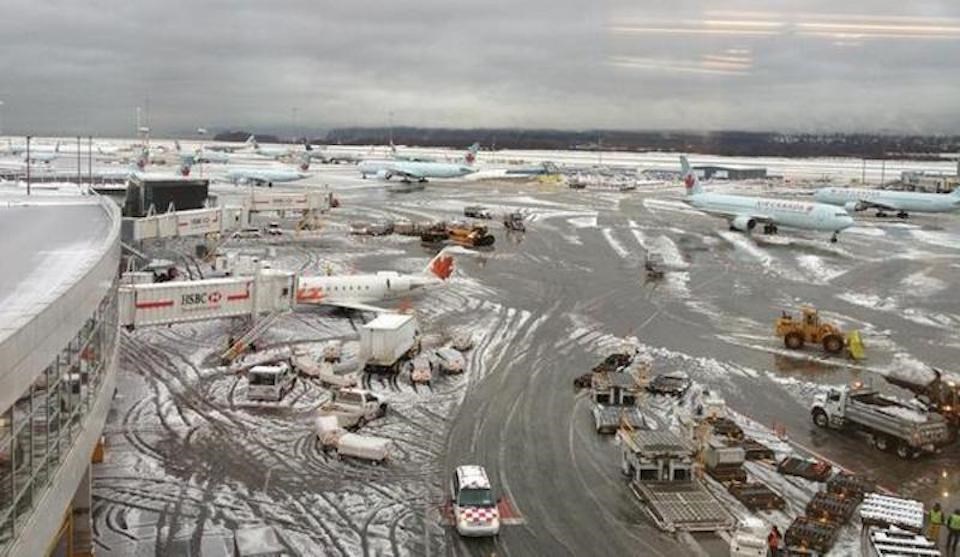Travellers headed on a flight, ferry, or a long drive will want to prepare for potentially dangerous winter weather this week.
A blast of Arctic air is slated to make its way down from the B.C. Interior into the Lower Mainland overnight Wednesday, Jan. 10, bringing bone-chilling temperatures multiple degrees below seasonal averages.
Environment Canada warned of powerful winds and possible thunderstorms following a spell of wet snow across Metro Vancouver on Monday, Jan. 8.
BC Ferries cancelled several sailings due to strong winds on Tuesday morning, including sailings between Tsawwassen and Swartz Bay (Victoria) as well as Duke Point, Nanaimo; Vancouver's Horseshoe Bay departures were unaffected and all ferries resumed to the normal schedule by 11 a.m., spokesperson Deborah Marshall told V.I.A.
Vancouver International Airport (YVR) says it hasn't seen any impacts from the wintry conditions but is bracing for the upcoming cold weather event.
“We are aware of forecasted winter weather this week and have activated our team and snow response program with additional staffing and equipment both in the terminal and on our airfield to keep passengers and planes moving safely," YVR said in a statement.
Vancouver International Airport
Travellers should check weather conditions several days in advance of their flight in their departure city and destination. If your flight is in North America, keep an eye on significant storm patterns developing across the continent.
There haven't been any Vancouver flights cancelled due to local weather but YVR will monitor the forecast closely.
Arrive at least two hours in advance of domestic flights, and three hours in advance of U.S. and international flights. Provide extra time in case you run into inclement weather, traffic, or any other issues that could cause a travel delay.
YVR advises travellers to consider taking the Canada Line to the airport. The train takes them from the heart of downtown Vancouver to the terminal door in 30 minutes or less via 16 stops.
There are a few different options available for air passengers looking to take advantage of long-term parking at YVR. All of them are priced based on convenience, meaning the faster you can get to the terminal from your car, the higher the cost of keeping your vehicle at the airport. Have a look at the pros and cons of these options.
Always book travel insurance with trip interruption, trip cancellation, medical for over at least $5 million, and comprehensive baggage loss and delay. Read the fine print closely.
YVR offers several tips to help travellers save time at the airport.
BC Ferries
BC Ferries recommends arriving at the terminal approximately 45-60 minutes before your scheduled departure. Walk-on passengers should arrive 45 minutes before their anticipated sailing.
Travellers should also check the forecast before leaving to get to their sailing and provide extra time during inclement weather.
Marshall said snowfall doesn't tend to impact operations but strong winds can result in cancellations. Customers who travel during poor weather should dress warmly and wear appropriate footwear.
BC Ferries will continue to monitor the forecast closely and will update its website about cancellations and delays.
Parking lots at the major terminals fill up quickly at peak periods. If possible, choose public transit or arrange to be dropped off at the terminal to avoid traffic congestion. For schedule information visit TransLink online.
Stay updated with road conditions by following @DriveBC and dress for cold and wet weather, including appropriate footwear to avoid slips, trips and falls. Follow @BCFerries on X (formerly Twitter) for regular updates, seven days a week.
Travel on B.C. highways
Environment and Climate Change Canada meteorologist Alyssa Charbonneau told V.I.A. drivers should prepare for treacherous conditions on B.C.'s highways ahead of the winter storm.
While the forecast includes the possibility of snowfall on each day starting on Thursday and continuing through the weekend, the probability "is very uncertain." However, cold arctic air and moisture are the necessary ingredients for "widespread snowfall" in Metro Vancouver, Charbonneau notes.
Ahead of the winter storm later this week, parts of the Coquihalla Highway and Highway 3 are expected to receive 20 to 30 cm overnight Tuesday, making driving conditions treacherous. Additionally, winds gusting up to 70 km/h with blowing snow means visibility will suddenly be "reduced to near zero" at times.
The City of Vancouver has some examples of emergency kits that you can assemble to keep in your home for emergencies. Similar ones can be kept in your vehicle. They should contain food, water, clothing, medicine, money, and any other supplies that you would require if you found yourself stuck on a highway during poor weather.
Here is a list of life-saving supplies you should have in the event of an emergency:
- Compass
- Road maps
- Fire extinguisher
- First-aid kit
- Seat belt cutter
- Emergency food pack
- Flashlight and batteries
- Matches and a survival candle in a deep can (to warm hands and drinks)
- Survival blanket
- Extra clothing or footwear
- Ice scraper and brush
- Methyl hydrate (to de-ice fuel lines and windshields)
- Sand, salt, or cat litter (to help with traction in icy conditions)
- Shovel
- Traction mats
- Tow chain
- Booster cables
- Warning light or road flares
- Axe or hatchet
- Cloth or paper towels



